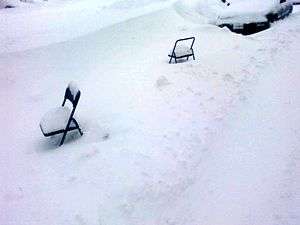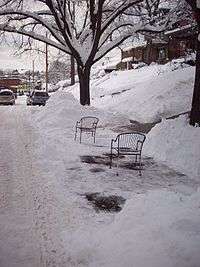Parking chair

A parking chair is a chair that is used by a vehicle owner to informally mark a parking space as reserved for oneself (in Chicago parlance). Other objects are also used for this purpose, including trash cans, ladders, ironing boards, and other similar-sized objects that are commonly found in households. For curbside parking spaces, two or more items are normally used; for angle spaces, only one is needed.[1]
The practice of using parking chairs is common in snowy weather within urban residential areas of the United States where vehicle owners do not wish to risk losing their vehicle's previously occupied space in its absence. Other spaces may be hard to find due to accumulation of uncleared and plowed snow, and the owner of a vehicle may have invested considerable work in clearing a parking space to free the car. This is common in areas where side streets are fully lined with parallel parked cars allowing only the center of the street to be cleared of snow, which then has the effect of pushing the snow onto the parked cars.
This practice is especially common in the Northeastern United States (Boston[2] and Pittsburgh[3]) and the Upper Midwest and Great Lakes regions (Chicago[4]). In Pittsburgh and Chicago, the use of parking chairs is considered to be an "iconic" regional practice.[5]
Use in inclement weather
In snowstorms, vehicle owners with such a need mark the space as their own that their vehicle previously occupied after digging out the heavy snow that covered the vehicle and blocked them in.[6] The legality and level of enforcement of existing laws pertaining to this practice varies by location. Generally, curbside parking spaces are public property and are available to vehicles on a first-come, first-served basis. Still, respecting these makeshift markers has been accepted by citizens as a common courtesy during snowstorms.[7]
The practice is often most effective when accompanied by the threat or actual occurrence of a "look of consternation" from a vigilant, often elderly neighbor who "keeps watch" in their neighbor's absence. While use is year-round, it is a particularly time-honored tradition in times of heavy snowfall accumulation, when a resident who "digs out" their spot on the street essentially declares ownership,[8] which often goes unchallenged by neighbors for fear of retribution.[9][10]
The idea of the practice is that the person reserves the space from which they have freed their vehicle for future parking during the remainder of the storm and as long as snow remains on the ground.[11] It is generally a Lockean recognition that the effort of the physical exertion of digging provides an entitlement to the space where the vehicle was previously located.[12] But in some instances, spaces get reserved in this fashion even before a snowstorm starts.[13][14]
Origin

The practice is common throughout areas of the United States susceptible to large amounts of snow and where curbside parking on residential streets is the norm, especially in the Northeast.[15]
Photographic evidence of the tradition has been found dating back at least to the 1950s. It is believed that the practice has existed even earlier, as the number of vehicles on residential streets has exceeded the number of available spaces.[16]
The items used have sometimes been referred to as "Pittsburgh Parking Chair" due to their use in the city of Pittsburgh.[16] In severe instances of snow accumulation, this practice extends beyond the city of Pittsburgh proper, and can be found in semi-suburban neighborhoods that border the city limits, such as Brentwood, Crafton and Dormont. While such ad hoc parking restrictions have no legal standing in the City of Pittsburgh, common and long standing community tradition supports their use. As the "parking chair" is part of the culture of the city, local police generally turn a blind eye to these impromptu markers, which under legal jurisdiction, technically qualify as "abandoned furniture."[17][18]
The origin of this practice might be found in foreign countries, as it is common also in southern Italy.
Legality
The practice has been outlawed in some places, including the city of Washington, D.C., where enforcement is strict and violators are ticketed.[19] Some places specifically prohibit the practice, with levels of enforcement that vary. Sanctions against violators may include fines and confiscation of the markers. Other places either do not enforce or make legal allowances for this activity.
In Baltimore, after the First and Second blizzards of 2010, Mayor Stephanie Rawlings-Blake announced that the city would not enforce an existing ban on the practice. She said that it could not be stopped, just like "people saying Hon" could not be stopped.[20]
Some places, including Pittsburgh, do not place legal sanctions against those engaging in the practice, but make clear that anyone has the right to claim an informal space that was reserved by someone else for their own vehicle, regardless of courtesy. However, it is a general practice around the city to respect the markers of others.[21] In 1994, Police in Dormont, a suburb of Pittsburgh, confiscated the markers from 200 spaces due to excessive complaints.[10] Pittsburgh retailers sell novelty "Official Parking Chairs."[5]
In Boston, the law prohibits residents from saving the spaces they clear for longer than 48 hours from the moment a snow emergency is declared to be over.[22]
In Aldan, Pennsylvania, the police chief confiscated all markers that were placed following the blizzards of 2010. He stated that he was enforcing a local ordinance in doing so.[23]
Criticism
Most dense residential urban streets have fewer parking spaces than residents owning vehicles. Despite this, it is rare that all residents require a parking space at the same time. When residents use parking chairs or other markers to claim spaces, they effectively reduce the parking available to everyone, by removing the efficiency that first-come, first-served public parking normally provides.[24] Furthermore, guest and work vehicles are discouraged from using available spaces when needed out of fear of retribution. Many citizens cite that despite the existing law prohibiting space savers' use after 48 hours after a declared snow emergency, residents still use them without penalty. This means that public property is being illegally claimed by an individual for their own private use.
Disorderly behavior
Even in cities where parking chairs are generally tolerated, such as Pittsburgh, local police make it clear that public street parking cannot legally be reserved. Citizens are explicitly discouraged from using objects to block parking spaces. Because parking chairs are considered abandoned furniture, they may be removed at any time.[25] It is common for municipalities to forcibly remove the offending objects from time to time.
See also
| Wikimedia Commons has media related to Parking chairs. |
References
- ↑ "Marking out some room of one's own". Baltimore Sun. 2010-02-10. Retrieved 2010-12-25.
- ↑ "Boston parking-spot savers - a winter guide". Boston.com.
- ↑ Kirkland, Kevin (2010-02-10). "Pittsburgh residents are using chairs, different items to stake out parking spots". Pittsburgh Post-Gazette.
- ↑ "Straight Dope Chicago: How did parking-spot 'dibs' start in Chicago, and what are the rules?". straightdope.com.
- 1 2 O'Neill, Brian (December 8, 2013). "Traditional practice of using parking chairs raises new reservations". Pittsburgh Post-Gazette. Retrieved December 9, 2013.
- ↑ "Snow Further Limits D.C. Parking | ABC 7 News". Wjla.com. 2010-02-08. Retrieved 2010-12-25.
- ↑ "Yinzer Justice Swift For Disrespecting Parking Chairs - WTAE Pittsburgh". Thepittsburghchannel.com. 2010-02-09. Retrieved 2010-12-25.
- ↑ "Eminent Domain Abuse: If They Can't Tax It, They'll Just Take It". ntu.org. Archived from the original on 2 June 2006.
- ↑ "Yinzer Justice Swift For Disrespecting Parking Chairs - Pittsburgh Weather News Story - WTAE Pittsburgh". Thepittsburghchannel.com. 2010-02-09. Retrieved 2010-12-25.
- 1 2 Kirkland, Kevin (February 10, 2010). "Pittsburgh residents are using chairs, different items to stake out parking spots". Pittsburgh Post-Gazette.
- ↑ Richard A. Epstein, ed. (2007). Economics of property law. Cheltenham, UK: Edward Elgar. p. 243. ISBN 978-1-84720-114-0.
- ↑ Lindsay, Jay (Dec 31, 2004). "City cracks down on Boston tradition of reservation parking". Spartanburg Herald-Journal. Boston. p. A8. Retrieved 26 December 2011.
- ↑ Schworm, Peter (February 10, 2010). "Saving spaces, even before the storm hits". The Boston Globe. Archived from the original on February 13, 2010.
- ↑ Polaneczky, Ronnie. "City officials brace for more snow | Philadelphia Inquirer | 02/09/2010". Web.archive.org. Retrieved 2016-09-15.
- ↑ Philip Selznick; Martin Krygier; Kenneth I. Winston (2002). Robert A. Kagan, ed. Legality and community : on the intellectual legacy of Philip Selznick (illustrated ed.). Lanham, MD: Rowman & Littlefield. p. 153. ISBN 0-7425-1625-3. Retrieved 26 December 2011.
- 1 2 Kirkland, Kevin (February 10, 2010). "Pittsburgh residents are using chairs, different items to stake out parking spot". Pittsburgh Post-Gazette. Retrieved 26 December 2011.
- ↑ Homeowners Protect Parking Spots With Chairs; Can They Do This?, WPXI Pittsburgh, February 8, 2010
- ↑ Kirkland, Kevin (February 10, 2010). "Pittsburgh residents are using chairs, different items to stake out parking spots". News Article. Pittsburgh Post-Gazette. Retrieved February 10, 2010.
- ↑ "It's a no-no to mark your parking space after shoveling". wtop.com. 2009-12-22. Archived from the original on 2011-06-11. Retrieved 2010-12-25.
- ↑ "Mayor won't enforce spot-saving ban". UPI.com. 2010-02-10. Retrieved 2010-12-25.
- ↑ "Homeowners Protect Parking Spots With Chairs; Can They Do This?". Wpxi.com. 2010-02-08. Archived from the original on 2010-02-12. Retrieved 2010-12-25.
- ↑ Finer, Jonathan (January 1, 2005). "Boston Fights Winter Parking Tradition". The Washington Post. Retrieved May 21, 2010.
- ↑ PAUL LUCE (pluce@delcotimes.com). "Aldan police making sure you don't reserve your shoveled parking spot". delcotimes.com. Retrieved 2010-12-25.
- ↑ "Parking-space etiquette: Chair-ish is the word". philly.com. Archived from the original on 23 February 2010.
- ↑ "'Parking chairs' pop up even more - Pittsburgh Tribune-Review". Pittsburghlive.com. 2010-02-10. Retrieved 2010-12-25.
External links
- News article with parking chair etiquette
- Gallery of Pittsburgh Parking Chairs
- Sketch of Pittsburgh Parking Chair, with commentary
- "Now yinz know not to break the rules." WTAE on Parking Chairs
- Pittsburgh Dad on the Parking Chair
- Post-Gazette article on the Parking Chair
- Boston's Space-Saving Tradition Explained